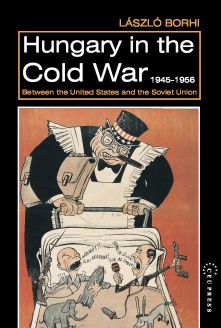

HUNGARY IN THE COLD
WAR 1945-1956
Between the United States and the Soviet Union
By László Borhi, Institute of History, Hungarian Academy of Sciences, Budapest.
Based on new archival evidence, examines Soviet Empire building in Hungary and the American response to it. Hungary was not important enough to resist the Soviets, its democratic opposition failed to win American sympathy, the US simply had no leverage over the Soviets, who sacrificed cooperation with the West for a closed sphere in Eastern Europe. The imposition of a Stalinist regime assured Hungary's unconditional loyalty to Soviet imperial needs. Unlike the GDR, Eastern Europe was never considered a bargaining chip for bettering relations with the West.
The book analyzes why, given all its idealism and power, the US failed even in its minimal aims concerning the states of Eastern Europe. Eventually both powers pursued power politics: the Soviets in a naked form, the US subtly, but both with little regard for the fate of Hungarians.
2004, CEU University Press,
354 pages
ISBN 978-963-9241-80-0 hardcover $49.95 / €42.95 / £31.95
"Borhi opens the Hungarian archives for English readers and tells
from a Hungarian perspective the familiar stories of the end of World War
II, the imposition of the Soviet model on Eastern Europe, and the explosion
of 1956. Not only does this yield new detail that considerably complicates
the stark narrative of the Cold War years, but it also puts motivations and
events in a new light."
- Foreign Affairs
|
List
of Contents
|
|
| Introduction | |
| I | We do not wish to move a finger |
| II | The Myth of Democracy |
| III | The Merchants of the Kremlin Chapter |
| IV | The Communists Take Over |
| V | Empire by Coercion |
| VI | Containment, Rollback, Liberation or Inaction? |
| Conclusion | |
| Bibliography | |
| Index | |